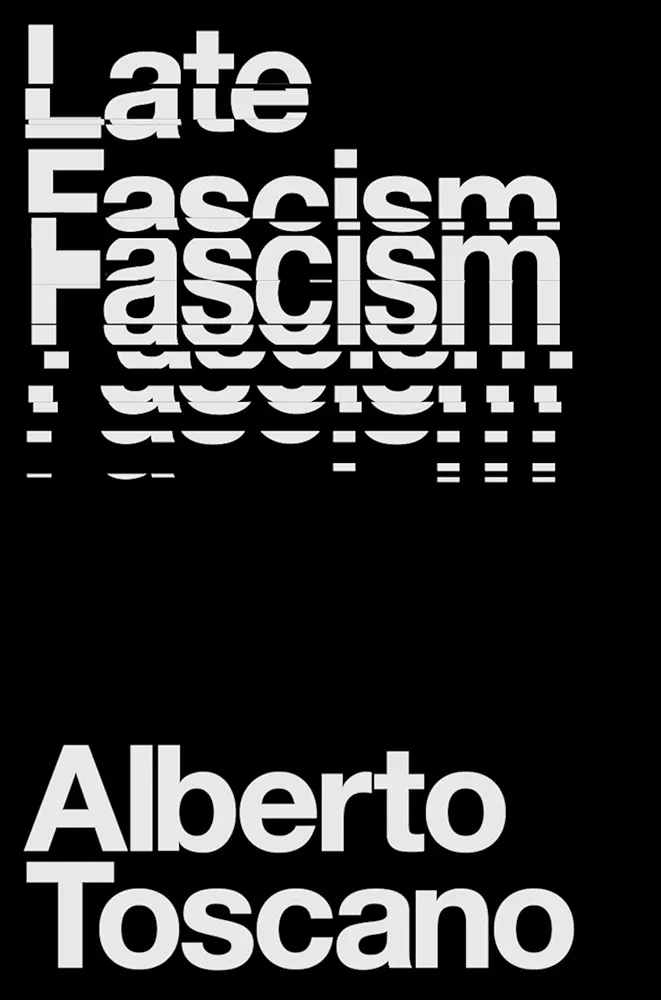Lavinia a publié une critique de Late Fascism par Alberto Toscano
Race, Capitalism and the Politics of Crisis
4 étoiles
Alberto Toscano's book "Late Fascism: Race, Capitalism, and the Politics of Crisis" challenges conventional understandings of fascism, that associate fascism primarily with the kind of political violence experienced by past European regimes, offering instead a nuanced perspective that transcends historical boundaries.
Toscano’s main argument is that the traditional framework for identifying and understanding contemporary fascism is insufficient. Mussolini's and Hitler's Germany, he argues, were not isolated phenomena but rather crystallisations of a broader historical process. The association between fascism and a monolithic, bureaucratic state, as dictated by Italian fascism or national socialism, is insufficient to comprehend modern fascism. Instead, Toscano proposes that we should see fascism as a changeable process formed by racial and colonial capitalism and one that is intimately linked to capitalism's demands for domination.
Toscano's analysis of far-right movements, particularly in the U.S., extends beyond historical fascist regimes. Drawing inspiration from Black radical and anti-colonial …
Alberto Toscano's book "Late Fascism: Race, Capitalism, and the Politics of Crisis" challenges conventional understandings of fascism, that associate fascism primarily with the kind of political violence experienced by past European regimes, offering instead a nuanced perspective that transcends historical boundaries.
Toscano’s main argument is that the traditional framework for identifying and understanding contemporary fascism is insufficient. Mussolini's and Hitler's Germany, he argues, were not isolated phenomena but rather crystallisations of a broader historical process. The association between fascism and a monolithic, bureaucratic state, as dictated by Italian fascism or national socialism, is insufficient to comprehend modern fascism. Instead, Toscano proposes that we should see fascism as a changeable process formed by racial and colonial capitalism and one that is intimately linked to capitalism's demands for domination.
Toscano's analysis of far-right movements, particularly in the U.S., extends beyond historical fascist regimes. Drawing inspiration from Black radical and anti-colonial theories, he explores the intersection of fascism, settler colonial formations, and extreme neoliberalism. By drawing on the insights of figures like Angela Davis and George Jackson, whose work sheds light on the racial dynamics and power structures that underpin far-right movements, Toscano exposes the racialised nature of political violence, emphasising the systemic targeting of marginalised communities.
To gain a deeper understanding of their complexity, Toscano examines the underlying political economy of far-right movements. He suggests that these movements arise from a sense of white homogeneity and the fear of annihilation and victimisation among privileged groups. Toscano introduces the concept of "repressive egalitarianism" within fascism, highlighting its foundations in an identity of subjection and a brotherhood of hatred. This notion challenges the notion that fascism is solely about the domination of one group over another. Instead, Toscano argues that fascism operates through a reproduction of power dynamics, sustaining itself by suppressing and eliminating those who are different or deemed as "other."
While Toscano does not explicitly discuss the relationship between fascism and feminism, his analysis of fascism could potentially be extended to consider gender hierarchies. Historically, fascists have generally argued that women's primary function was domestic and reproductive, expecting women to produce the future citizens, soldiers, and mothers of the race. The position of women in contemporary far-right parties is not dissimilar, promising to respect the advances made by women but attacking feminists and advocating policies that would actually remove many gains.
Fascism is a contentious topic that continues to shape the political landscape around the world. By understanding its historical roots and contemporary manifestations, we can actively fight its influence and work towards a society that embraces diversity and equality.

